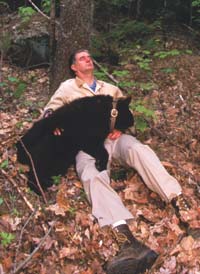 |
 |
| current issue |  |
past issues |  |
send a letter/news |  |
address update |  |
advertise |  |
about us |  |
alumni home |
Features
The Bear EssentialsPage 4 of 4
Squirty eyed me suspiciously as she walked up to greet Kilham, whom she still seemed to regard as her mother. The two cubs peered down nervously from their perch. Ben sat next to Squirty and stroked her neck, saying softly, "He's all right, Squirty. He's with me. It's okay."
Squirty, however, wasn't so sure. She walked slowly toward me, her head down and teeth chomping. I looked at Kilham. "Hold still," he said.
When she was about 15 feet away, Squirty lunged at me and made a deep grumbling sound. I had just enough of my wits about me to know that I could never outrun a bear, but it was hard to heed Kilham's advice with 200 pounds of angry bear charging at me. Shaking slightly, I slowly backed up several feet. That seemed to be just what Squirty wanted. She turned, went back to Ben and snuggled into his lap.
| I had just enough of my wits about me to kow that I could never outrun a bear, but it was hard to heed Kilham's advice with 200 pounds of angry bear charging at me. |
The cubs, seeing that their mom was comfortable with Ben, soon climbed down and joined the pile. Squirty kept half an eye on me to make sure I didn't try to edge closer, but otherwise seemed relaxed. I didn't need any further proof that she could distinguish between Kilham and other human beings.
"I can hang out with them like that all day," Kilham said as we walked back to the three-wheelers. "I often do. It's how Squirty teaches me what it means to be a bear.
"There are houses with bird feeders and garbage cans all around here," he continued. "Squirty's been living on her own for two years, but she's never been near any of them. I don't think being raised by a surrogate mother has had any ill effects on her."
I returned to New Hampshire several times over the course of the next year. The cubs' progress was evident in their rapid growth and increasing independence. When Kilham had first taken them into the woods, they had followed him closely. By late fall they were leading the way and even disappearing for long stretches at a time. They had turned into fat balls of shiny fur. Houdini must have weighed 100 pounds. That winter, Kilham built a warm and cozy den for Yoda and Houdini, and he was there for them when they emerged in the spring.
By the following summer, Yoda and Houdini seemed to be perfectly independent and capable wild bears. Yoda established a territory near their winter den--females stay close to where they are raised--and Houdini began ranging far and wide, as male bears must. Life was hard for him now. He was not old enough to mate, and his wandering made him vulnerable to hunters. One day, after being attacked by an older bear, Houdini fled to a development where he had been fed before. This time he paid a high price for an easy meal. He was shot as he raided a bird feeder.
Houdini was only the second bear known to have been killed of the 34 Kilham has cared for. Most of his bears adapt naturally to the wild, and he continues to learn from them. By maintaining his relationship with Squirty, he was able to watch how she raised her cubs and apply what he learned to his care for Yoda and Houdini. They, in turn, taught him things that will make him an even better bear mom for the next set of orphans. And all of his bears add to our knowledge of this familiar but little-understood animal.
Despite his unconventional methods, biologists have come to admire Kilham's work. "I learned more about bear behavior in six hours with Ben and his bears than in the past 20 years," said Eric Orff '72, a senior wildlife biologist with the New Hampshire Fish and Game Department and an expert on bears.
 After a close encounter with the photographer, Squirty snuggles with Kilham. Photo by Robert Caputo |
"This is definitely a two-way street," Kilham said on my last trip, as we watched Yoda disappear into the woods. "I help the cubs; they teach me. I've learned a lot about bears that was previously unknown, simply because they accept me as part of their world. I hope that what I learn will help us understand and protect them.
"But most of all," he said as Yoda turned to look back at us, " I just like being out here with them."~
Robert Caputo is a freelance writer and photographer. Since 1980, he has regularly written about and photographed Africa, South America and Asia for National Geographic magazine. He is the author of Landscapes and People and Portraits, part of the National Geographic Photography Field Guide Series.
Page: < Prev 1 2 3 4Easy to print version
blog comments powered by Disqus
